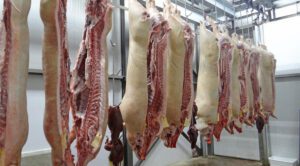
Ukraine exported 7.0 million tons of agricultural products in December 2022, down 2% from the previous month, the Ukrainian Agribusiness Club (UCAB) said on its Facebook page on Monday.
“3% of these exports were made through the “grain corridor”, the rest through alternative export routes. However, it is necessary to take into account that not all products had time to physically cross the border. A lot of products are now in line for export both by rail and road transport, which will negatively affect exports by alternative routes next month”, – Association specifies in its report.
UCAB noted that 4.9 million tons of crops were exported in December 2022, which is 4% more than in November. By crops, 3.09 million tons of corn (63% of total), 1.67 million tons of wheat (34%) and 147 thousand tons of barley (3%) were exported to foreign markets.
Ukraine also exported 868 thousand tons of oilseeds during this period – a third less than in November. Ukraine exported 295 tons of sunflower seeds (34%), 251 tons of soybeans (29%) and 217 tons of rapeseed (25%).
UCAB also noted that exports of vegetable oils in December fell by 9% against the previous month – down to 468 thousand tons, 94% of which was sunflower oil (440 thousand tons) and 6% soybean oil (29 thousand tons). In turn, exports of sunflower and soybean cake and meal increased by 58% to 506 thousand tons, including 90% of sunflower waste (455 thousand tons) and 10% of soybean oil (51 thousand tons).
“The greatest changes in the structure of exports in December 2022 are associated with a decrease in export shipments of oilseeds, which showed a drop of one-third from the previous volumes. This is primarily due to a decrease in export volumes of rapeseed. The rape grown in 2022 and intended for export is almost completely exported, there will be no significant shipments of this crop until next year’s harvest”, – UCAB stressed in the report.
However, the reduction in rapeseed exports will allow for increased shipments of other crops, particularly oilseed cake.
“In any case, Ukraine still has a significant amount of products destined for export, and there is a stable demand for Ukrainian agribusiness products in the world market. With current export volumes, it is gradually possible to take out stocks of grown products and partially generate foreign exchange earnings. The prices in Ukraine are still low, and logistics costs “eat up” the entire profit of the agrarians, which in turn jeopardizes the sowing season 2023″, the organization stated in its report.
As previously reported UCAB, Ukraine exported 7.2 million tons of agricultural products in November 2022, in October and September – 6.9 million tons, in August – 4.6 million tons, in July – 3.0 million tons and in June – 2.7 million tons. According to the Ministry of Agrarian Policy of Ukraine, in May agricultural exports amounted to 1.74 million tons, in April – 0.96 million tons and in March – 0.33 million tons.
Prior to the full-scale military invasion by the Russian Federation, Ukraine exported on average 5-6 million tons of agricultural products per month, mostly through its maritime infrastructure in the Black Sea.

Some Ukrainian pork producers and processors plan to start exporting pork to EU next year as they study European regulations and prepare for unofficial audits on the compliance of their products with export requirements.
At the moment, four Ukrainian enterprises of the industry are interested in launching pork exports to Europe, according to the website of the Association of Ukrainian Pork Producers (ASU) on Thursday.
“We have been working with experts and the veterinary service to have “draft” questionnaires ready in advance for enterprises that want to check whether they meet the requirements of EU regulations. A number of processors interested in exporting pork have gone through these questionnaires to assess what they need to polish to prove their compliance with regulations,” the organization quotes its president Oksana Yurchenko as saying.
According to her data, the EU “has a certain understanding” that next year may be introduced certain indulgences for Ukrainian pork products, which before the full-scale Russian aggression was not even particularly discussed.
“Next year, in cooperation with international organizations, we will start informal audits to support such producers. Now there are four enterprises,” Oksana Yurchenko stressed in a statement.
According to ACU estimates, the European Union will be open to exports of Ukrainian pork for up to two years, and this is not a pessimistic scenario.
In turn, the industry is promoting the official approval of international certificates for the export of pork to Vietnam and Hong Kong, but so far it is not very relevant, because the sea routes are closed due to the aggression of Russia, and other logistics for producers financially unprofitable.
As reported, on May 11, 2022, the European Commission allowed the export of pork, beef and processed meat products produced in Ukraine to third countries via the EU.
As of February 1, 2022, the total number of pigs in Ukraine amounted to 5.56 million, a decrease of 3.4% compared to the same date in 2021. Data for the following months was not published by the State Statistics Committee due to the beginning of full-scale Russian military aggression in Ukraine.
Consumption of pork per capita in Ukraine this year will be 20 kg/year, up slightly from 19.9 kg/year in 2021. A total of 625 thousand tons of meat and meat products will be produced in the country during the year.

Ukrainian producers in December 2022 got the right to export poultry and poultry products to Canada and fish products to Turkey, the website of the State Service of Ukraine for Food Safety and Consumer Protection (Derzhsprodpotrebbezopasluzhba) said on Wednesday.
According to her, the new markets for business are open thanks to the joint work of the department, the Ukrainian Ministry of Foreign Affairs and foreign embassies.
The relevant work to open the Canadian market for Ukrainian poultry meat and meat products began back in 2019, when representatives of the Canadian certification body CFIA conducted an inspection of the state production control system at Ukrainian enterprises. A list of Ukrainian companies that are now allowed to export poultry meat and poultry products to Canada has been added to the CFIA database, and requirements for importing meat products from Ukraine to Canada have been published on the organization’s official web portal.
According to the Service, in December Ukraine also received the right to export fish products to Turkey for export. The form of the relevant certificate has already been posted on the official web portal of the State Service of Ukraine for the Protection of Consumer Rights.
As reported, during the martial law in Ukraine has increased the number of enterprises-producers of products of animal origin, which have the right to export their products to the European Union. Their number increased by 33 (or 8.5%) compared with winter 2021 – up to 418 from 385. The number of Ukrainian exporters of dairy products increased the most – by 11, fish products – by six, snails and products from them – by five.

The Ukrainian real estate market is unbalanced, amid low demand and declining new supply, reported prices from developers are growing, while rental prices are falling, according to the National Bank of Ukraine (NBU) Financial Stability Report for December 2022.
It notes that demand for housing remains weak and unstable: the interest of few buyers depends on the intensity of the shelling of settlements and decreased again in the fourth quarter.
The existing demand is focused primarily on ready-made housing for residence, almost zero speculative for the purpose of further resale or lease.
The number of new buildings under construction is slowly increasing after an almost complete standstill in the first months of the war. In the country as a whole, work has resumed on more than two-thirds of sites, mostly in housing complexes in the final stages of construction. At other sites the resumption of work has occurred only on paper.
According to the State Statistics Committee of Ukraine, for the three quarters of 2022 completed construction of 2.8 million square meters. m multifamily housing. As noted in the report, this is half the record for the same period in 2021 and only a quarter less than the average of the previous five years.
Much worse is the situation with the start of new projects. In the first nine months of this year, developers received permits to build half as many multifamily units as the average for the same period of the previous four years. However, obtaining permission is not an indication of the start of construction – the actual start of construction work can be delayed for a long period.
The report also reminds us that, according to the “Russia Will Pay” project, more than 16,000 apartment buildings and almost 127,000 private homes have been destroyed or damaged since the start of the full-scale war until November.
The low activity of the primary real estate market, together with the significant amount of housing damaged by the shelling, will lead to a reduction in the supply of housing in the near future, and in the future to a possible shortage of housing. At the same time, the declared purchase prices are mainly increasing, while the rental prices remain almost twice as low as before the war.
The report states that the multidirectional price movements reflect an imbalance in the real estate market, relatively cheap rents will deter demand for the purchase of housing.
The price-to-rent ratio has risen substantially since March and is now at an all-time high. In terms of price, renting seems to be a better alternative than buying, and this situation will persist for a long time.
Export of Ukraine by countries in Jan-Oct 2022

export.gov.ua
Dynamics of export of goods in 2021-2022

export.gov.ua